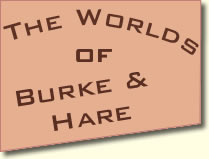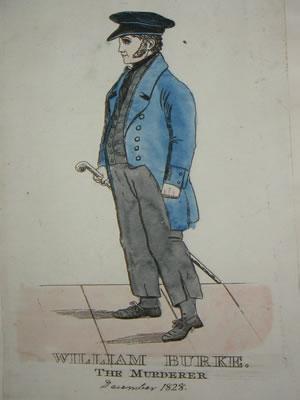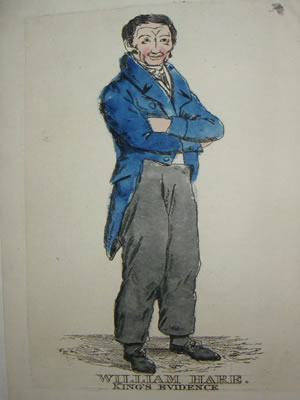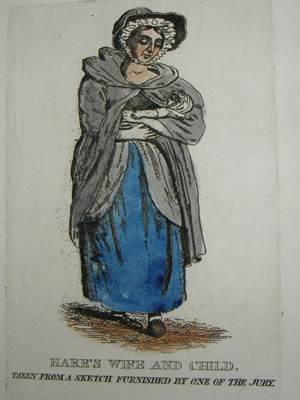
Murder is no novel crime, it has been done in the olden time as well as now; but murder perpetrated in such a manner, upon such a system with such an object or intent, and accompanied by such accessory circumstances, was never, we believe, heard of before.
West Port Murders
The Alleged Perpetrators
When they turned to murder, neither William Burke nor William Hare had any prior criminal record, or history of criminal behavior. William Burke was originally from Ireland. He had come to Scotland about 1817 as a "navvy", or navigator, a laborer working on the Union Canal. He was married, with two children in Ireland, but when he wrote to his wife she refused to join him. He probably met Helen M'Dougal when working on the canal near Sterling. By 1828, the couple had lived together for about ten years, and were assumed to be respectably married. Burke worked at a variety of trades, eventually settling on shoemaking. He could read and write, and had a charming, outgoing manner.
William Hare had also come to Edinburgh as a laborer; he worked in the canal basin, and sold fish in a cart. He had married Margaret Hare sometime around 1826. She was a widow; her husband had run a lodging house in Tanner's Close in the West Port, and she took it over on his death. She seems to have had one child by her first husband, and another with Hare. The second was an infant in December 1828, and so she must have been pregnant during the period of the murders.
Burke's and Hare's guilt for the 16 murders has never been in doubt, and virtually all commentators have agreed that Margaret Hare knew about them, and may have assisted or even initiated some of them. Burke and Hare split the money they earned, and Margaret Hare always took £1 "for the use of her house." Most commentators have also assumed that Helen M'Dougal was complicit in the murders, but there is less direct evidence for it. She had seen many of the victims while they were alive, and the clothing of one of them, Mary Paterson, was later found in her possession. Still, Burke claimed she had known nothing about the murders, and that she believed him to be a resurrectionist, that is, a grave-robber,obtaining cadavers through less sinister, though still illegal, means.
Neither Burke nor Hare -- nor Margaret Hare nor M'Dougal, for that matter -- were ever resurrectionists.
Click on thumbnails to view slideshow.
Images courtesy of the Library of the Royal College of Physicians of Edinburgh.



